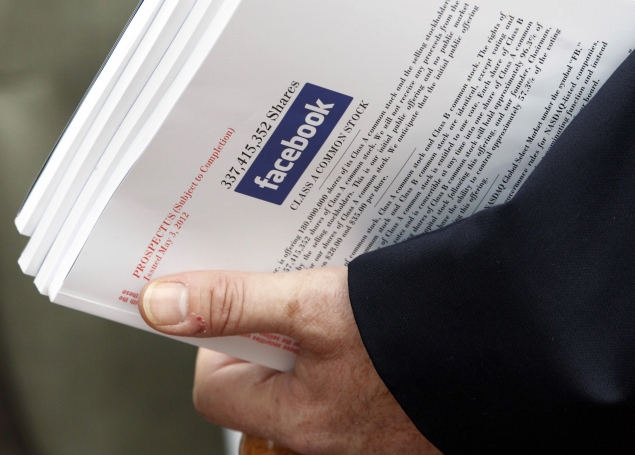- Home
- Social networking
- Social networking News
- Facebook IPO fallout: Citigroup fined $2 million
Facebook IPO fallout: Citigroup fined $2 million

It was the first formal charge involving an underwriter's disclosure of sensitive financial information ahead of the social media company's $16 billion initial public offering in May. Lead underwriter Morgan Stanley has come under criticism for revealing revised Facebook Inc earnings and revenue forecasts to select clients on conference calls ahead of the IPO, leaving the rest of the investing public in the dark.
In the Citi case, a junior analyst working for Mahaney emailed some research to journalists at the Techcrunch news website, who published some of the information in a blog post, according to the Massachusetts complaint released on Friday.
The state's top securities regulator, William Galvin, charged Citigroup Global Markets Inc with breaking Massachusetts securities laws that prohibit analysts at underwriting firms from sending "written research or other written content" until 40 days after Facebook's IPO.
He would not say how close his office might be to charging any other firms, or what kind of evidence they may have. Gavin said the Citi case was completed first because his office was able to obtain emails showing how the analysts broke the rules.
Some market participants questioned whether the Citi analysts' actions were that bad. They noted that Mahaney has consistently received high marks in surveys of institutional investors.
Citi fired Mahaney and the junior analyst, and said it was pleased that the matter with Massachusetts has been resolved.
Galvin told Reuters he is still probing the other underwriters involved in Facebook's IPO, including Morgan Stanley, Goldman Sachs and JPMorgan Chase.
"Unfortunately, the message from this is that analysts should give less information to cover their behinds. But the smooth functioning of markets requires the exact opposite of this," said Max Wolff, chief economist and senior analyst at research firm GreenCrest Capital.
"This is a move in the wrong direction," he added.
Legal experts say it is unclear whether industry rules specifically prohibit brokerages from giving information to select groups of clients in a phone call, as Morgan Stanley did. So far, there has been no regulatory action against Morgan Stanley or any of its analysts.
Star analyst misconduct
According to the Massachusetts complaint, an unidentified junior analyst sent some of Citi's confidential views on investment risks and revenue estimates for Facebook to two employees at TechCrunch.com, which is owned by AOL Inc, three weeks before Facebook went public on May 18.
Mahaney failed to supervise this junior analyst, according to the Massachusetts complaint.
One of the most respected Internet analysts on Wall Street, Mahaney had already been in trouble with his bosses for sharing information with journalists.
On April 11, Citi's director of research for the Americas sent Mahaney a "letter of education," noting that he had broken the bank's rules when he spoke to journalists at Bloomberg and the New York Times without first obtaining legal approval, according to the complaint.
Only weeks after receiving that letter, Mahaney again broke Citi's rules when he passed unpublished views about Google Inc's YouTube revenue estimates and profitability to a reporter at Capital Magazine, a French publication, the civil complaint said.
Mahaney came to Citi in 2005 from Galleon Group, the hedge fund led by Raj Rajaratnam, who was later convicted in one of the biggest insider trading crack-downs in U.S. history.
Facebook debacle
After Facebook's debut, smaller investors were outraged to learn about the Morgan Stanley's conference calls that they felt gave an edge to its big clients.
The head of the Financial Industry Regulatory Authority (FINRA), Wall Street's self-regulator, said not long after the May 18 Facebook debut that allegations surrounding Morgan Stanley's conference calls were a matter of "regulatory concern." FINRA declined to comment further on Friday.
U.S. Securities and Exchange Commission Chairwoman Mary Schapiro also said at the time that there are "issues we need to look at specifically with respect to Facebook." An SEC spokesman said there has been no public action since.
"The knives have been out looking for someone to blame for Facebook's IPO and it looks like this analyst has been caught in the middle," said Jill Fisch, a professor at the University of Pennsylvania Law School who focuses on securities regulation and capital markets.
"All these rules are designed to stop misuse of information for trading. This does not raise market regulation issues."
With various regulators looking at the Facebook listing, Galvin is the first to come out with a fine, albeit a small one.
Gavin has long had a reputation of being an aggressive regulator who has filed suit against Wall Street's top banks for securities law violations. But some have criticized him because he often settling high-profile cases for small sums.
"This is a recurring theme," Gavin said on Friday. "The banks promise there is a firewall between research and marketing, that they will observe the quiet period, but that is clearly not the case."
He added, "This is about not having two sets of rules one for preferred clients and one for everyone else," Galvin said.
© Thomson Reuters 2012
Get your daily dose of tech news, reviews, and insights, in under 80 characters on Gadgets 360 Turbo. Connect with fellow tech lovers on our Forum. Follow us on X, Facebook, WhatsApp, Threads and Google News for instant updates. Catch all the action on our YouTube channel.
Related Stories
- Samsung Galaxy Unpacked 2026
- iPhone 17 Pro Max
- ChatGPT
- iOS 26
- Laptop Under 50000
- Smartwatch Under 10000
- Apple Vision Pro
- Oneplus 12
- OnePlus Nord CE 3 Lite 5G
- iPhone 13
- Xiaomi 14 Pro
- Oppo Find N3
- Tecno Spark Go (2023)
- Realme V30
- Best Phones Under 25000
- Samsung Galaxy S24 Series
- Cryptocurrency
- iQoo 12
- Samsung Galaxy S24 Ultra
- Giottus
- Samsung Galaxy Z Flip 5
- Apple 'Scary Fast'
- Housefull 5
- GoPro Hero 12 Black Review
- Invincible Season 2
- JioGlass
- HD Ready TV
- Latest Mobile Phones
- Compare Phones
- Realme P4 Lite
- Vivo V70
- Vivo V70 Elite
- Google Pixel 10a
- Tecno Camon 50
- Tecno Camon 50 Pro
- Lava Bold N2
- Vivo V60 Lite 4G
- LG Gram 14 (2026)
- Asus Vivobook 16 (M1605NAQ)
- Infinix Xpad 30E
- Brave Ark 2-in-1
- Amazfit T-Rex Ultra 2
- boAt Chrome Iris
- Xiaomi QLED TV X Pro 75
- Haier H5E Series
- Asus ROG Ally
- Nintendo Switch Lite
- Haier 1.6 Ton 5 Star Inverter Split AC (HSU19G-MZAID5BN-INV)
- Haier 1.6 Ton 5 Star Inverter Split AC (HSU19G-MZAIM5BN-INV)







![[Partner Content] OPPO Reno15 Series: AI Portrait Camera, Popout and First Compact Reno](https://www.gadgets360.com/static/mobile/images/spacer.png)









